朝鮮勞動黨第七次代表大會
朝鮮勞動黨第七次代表大會
Seventh Congress of the Workers’ Party of Korea
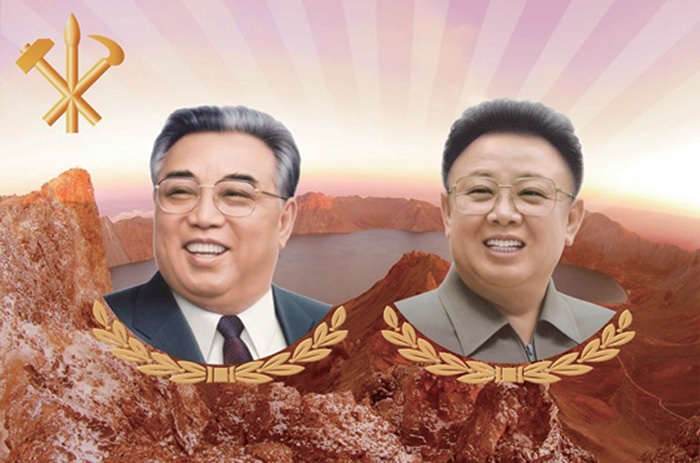
President KIM IL SUNG, Founder of Worker’s Party of Korea and Chairman KIM JONG IL, Eternal General Secretary of Worker’s Party of Korea
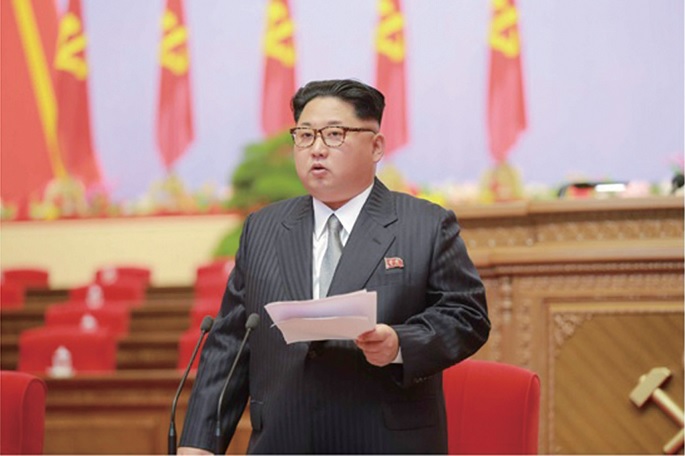
Leader KIM JONG UN Makes Opening Address at Seventh Congress of Worker’s Party of Korea
The Workers’ Party of Korea, the ruling party and guiding force of the Democratic People’s Republic of Korea, is striving to hasten final victory for the building of a thriving socialist country, holding fast to independence, Songun and socialism as its permanent strategy. In this situation, the Seventh Congress of Party convened in early of May 2016.
To look back, the congresses of the WPK with a history spanning 70 years were epoch-making events for strengthening the WPK and advancing the revolution and construction of the country.
The Inaugural Congress of the Central Organizing Committee of the Communist Party of North Korea, the predecessor of the WPK, held in October 1945 was a historic event that brought about a radical turn in building a new society and shaping the Korean people’s destiny.
Established soon after the country’s liberation from the Japanese military occupation on August 15, 1945, the Party presented the anti-imperialist, anti-feudal democratic revolution as its immediate task. It then successfully led democratic reforms, distributing crop fields to their tillers, nationalizing major industries and enforcing a labour law and a law on sex equality; it also launched mass movements including the general ideological mobilization movement for nation building, thus awakening the masses to their ideological consciousness and rousing them to the building of a new society. This brought about a radical change in the appearance of the country, once a backward colonial and semi-feudal one, in a short period of time.
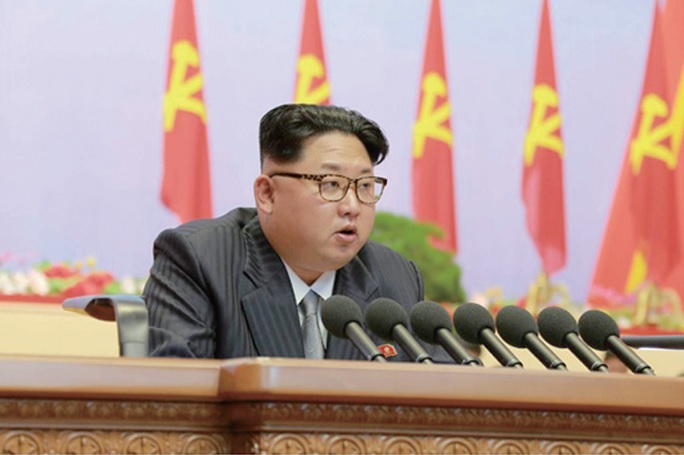
Leader KIM JONG UN Reviews the work of the Central Committee of the Worker’s Party of Korea
The Second Congress of the Workers’ Party of North Korea held in March 1948 set up a new milestone in further strengthening the unity and cohesion of the Party and consolidating it in quality, and roused the whole people to carrying out the tasks for the first period of transition to socialism. When the US unleashed the Korean war (1950-1953) against the DPRK to stamp out the country in its cradle–actually it was only less than two years after its founding (September 9, 1948)–the Party called the army and people to the struggle for victory in the war, thus defeating the US-led 16 allied imperialist forces and defending the sovereignty and dignity of the country with honour.
And by carrying out the postwar reconstruction on the ruins of war in a matter of three years, it demonstrated once again the might of the country to the US imperialists who had claimed that Korea would never be rebuilt within one hundred years.
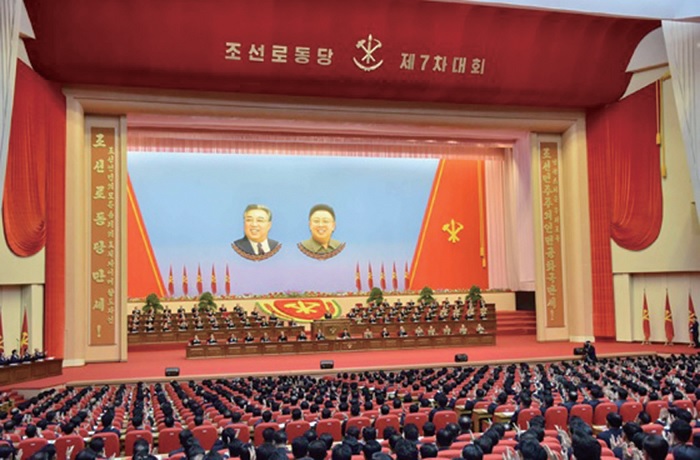
The Seventh Congress of the Workers' Party of Korea
The Third Congress of the Workers’ Party of Korea, which was held in April 1956, presented the task for completing the laying of the foundations of socialism.
By organizing and mobilizing the people, the Party carried out the agricultural cooperativization and socialist transformation of private and capitalist trade and commerce in a short period of time, thus establishing an advanced socialist system in the country and developing it into a socialist industrial and agricultural state with firm foundations of an independent national economy.
At the Fourth Congress of the WPK held in September 1961, the Party reviewed the successes achieved in the socialist revolution and construction and advanced an ambitious programme of the First Seven-Year Plan for reaching the goal of socialism.
Amid the acute situation at home and abroad created by the Cuban Missile Crisis and the incident of the Gulf of Tonkin, it achieved the epochal success of converting the country into a socialist industrial state while building up the economy and defences simultaneously.
At the Fifth Congress of the WPK held in November 1970, it set out the Six-Year Plan, another ambitious programme, and the tasks for hastening final victory of socialism and nationwide victory of the Korean revolution and continuously developing the Party.
The country strenuously promoted the three revolutions―ideological, technological and cultural―thus making a great progress in the struggle for hastening final victory of socialism and laying a firm foundation for accelerating the modelling of the whole society on the Juche idea in a comprehensive way.
The Sixth Congress of the WPK, held in October 1980, was a significant meeting which unfolded a blueprint for achieving prosperity unprecedented in the history of the country.
The congress defined modelling the whole society on the Juche idea as the general objective of the Korean revolution and presented the tasks for implementing the line of three revolutions―ideological, technological and cultural―together with ten long-term objectives of socialist economic construction that should be attained in the 1980s. Had the long-term objectives been realized, the DPRK would have joined on its own terms the rank of nations leading the world in economic development.
However, the Party faced an unexpected situation. At the end of the 1980s socialism started to collapse in several countries and the US-led imperialist allied forces took that opportunity to concentrate their anti-socialist offensive against the DPRK.
In this arduous period, the Party, upholding the banner of Songun, crushed the offensive of the imperialist allied forces and defended socialism. Furthermore, it opened up a new era of building a thriving socialist country.
The cause of building a thriving country is advancing dynamically in the DPRK now in the face of moves of the US and its followers to isolate and suffocate it.
In recent years, the single-hearted unity of the whole society, more powerful than an atomic bomb, has been consolidated remarkably, and numerous model, standard factories have been built in the era of the knowledge economy and the work of putting production lines on an informatized and modern basis has been promoted in a positive way amid the flames of the industrial revolution in the new century; all these are giving a fresh impetus to developing the overall economy and improving the people’s standard of living. The successive launch of indigenous satellites demonstrated the unfathomable strength of the country, and successful H-bomb test provided a sure guarantee for defending the sovereignty of the country, the right to existence of the nation and the peace and security of the region against the nuclear threat by the US.
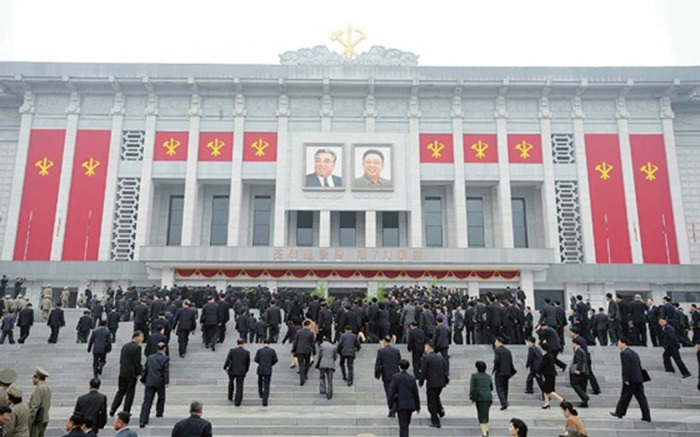
The Seventh Congress of the Workers' Party of Korea
The Seventh Congress of the WPK reviewed in a comprehensive way the brilliant successes it achieved in the revolution and construction under the leadership of the Great President KIM IL SUNG of the DPRK, and Chairman KIM JONG IL in the previous period and unfolded a bright blueprint for hastening final victory of the Korean revolution under the leadership of leader KIM JONG UN.
Today, the cause of socialism in the DPRK is being steadily defended by the Great leader KIM JONG UN.
Under his leadership, all the people are creating world-startling miracles and innovations in the building of a thriving socialist nation day after day to bring final victory earlier.
Through their life experience, the people of the DPRK have cherished socialism as their lifeline and are confident that only victory and glory are in store for them on the road of following the WPK.
As the WPK leads it full of unshakeable faith and will to carry out the cause of socialism, the DPRK will be ever victorious.
Source: Consulate General of the Democratic People’s Republic of Korea in Hong Kong





